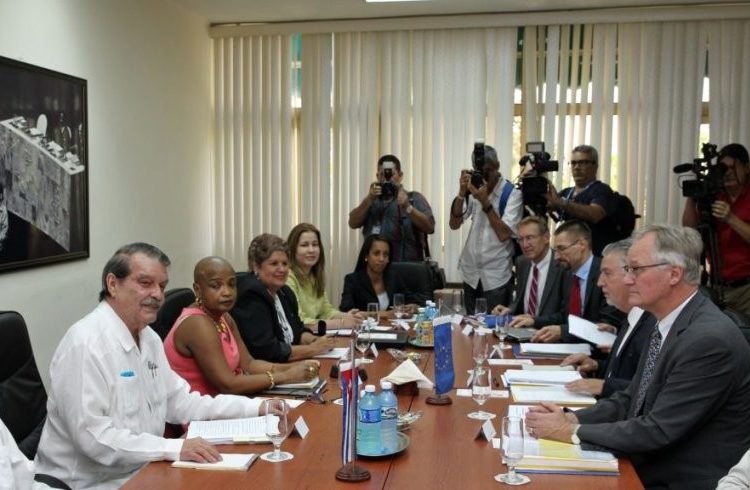Cuba and the European Union concluded in Havana the third round of negotiations for a bilateral agreement on political dialogue, cooperation, trade and economy. Although no details were offered, Cuban Deputy Foreign Minister Abelardo Moreno, who led the Cuban delegation in the negotiations said that the first session they made progress in labor issues, culture, education, health and agriculture, and described the talks as open, constructive and positive.
The last day of this two-day conclave, held at the headquarters of the Ministry of Foreign Affairs in Havana, focused on issues of cooperation, but the European side also made a “presentation” on political issues including human rights.
Meanwhile, Christian Leffler, executive director for the Americas of European External Action Service and Head of Delegation of the European Union, said at a press conference that after these two days they came out with a better understanding of the issues discussed and about the possibilities of completing it happily. “If we continue the way we work in this third round of talks in the next we will reap significant results on outstanding chapters and issues”.
“We have taken important steps and developments especially in the chapter on cooperation, which is the most important agreement” Leffler said. Questioned by reporters, he said that “is not a competition between the US and the EU. A more active (…) presence of the United States can help to strengthen the positive atmosphere to achieve progress in our discussions. ”
During the conference, Leffler said that in the negotiations they looked for a legal framework for dialogue, cooperation and trade, especially on issues such as governance and human rights. He also announced that the fourth of these contacts will run in Brussels, Belgium, on a date as of yet unspecified “before summer”.
Originally scheduled for January, this session was postponed in December at the request of the Cuban side shortly before the announcement of December 17, 2014. For 11 months, representatives of the EU and Cuba-whose relations were marked between 2003 and 2008 by sanctions to the island by the European community, because of the imprisonment of 75 opponents of the Cuban government and the execution of three men who tried to hijack a vessel- are negotiating with a view to an “Agreement on Political Dialogue and Cooperation”. The first of these meetings took place in Havana in April 2014 and the second in August of that year in Brussels.
Another sign of the desire to improve relations with Cuba by the Europeans is that the French presidency announced an official visit to Cuba on May 11 of François Hollande, the first by a French head of state to Cuba.
According to a Reuters report, the EU is already the largest foreign investor in Cuba, and EU officials say the proposed agreement with Cuba would give Brussels a more important role in market-oriented reforms of Havana.
In recent years, trade between Cuba and the EU has grown in volume, making the EU in the second partner after Venezuela, according to the European Bureau for Statistics Eurostat. Cuban exports are mainly raw materials, while exports from the EU to the island are manufactured goods.
However, it is worth remembering that Cuba is the only Latin American country with which the European Union still has no bilateral treaty. The “common position” toward Cuba in the 28 countries of the EU, adopted at the initiative of the then Spanish Prime Minister José María Aznar, has conditioned since then dialogue with the Caribbean nation.











Even better open talks with Greek Syriza & go around the ECB, IMF ect.